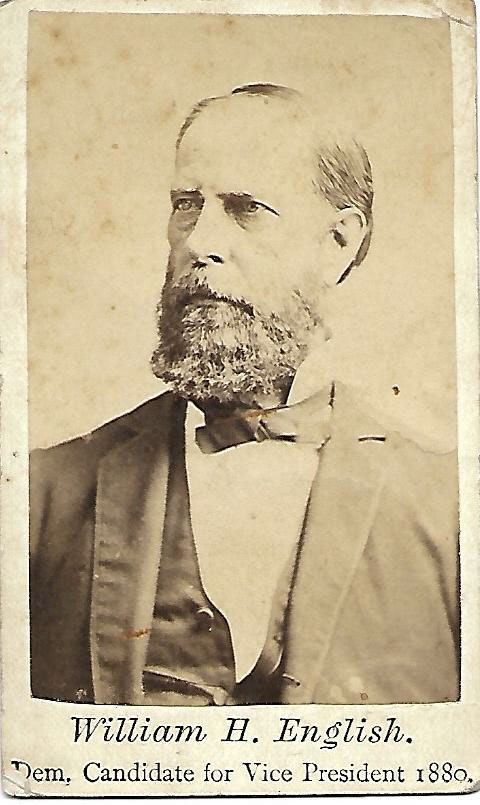Section #19 - Regional violence ends in Kansas as a “Free State” Constitution banning all black residents passes
Chapter 227: The “English Bill” Tries To Save The Lecompton Constitution
April 21, 1858
Congressman William English’s Offers His Kansas Ploy
The fireworks in Congress on admitting Kansas as a Slave State under the Lecompton Constitution continues through February and March 1859, and into April.
Southerners are unable to secure enough House votes to approve the measure; Republicans lack enough to block it for good.
Those caught in the middle are Northern Democrats seeking a way to honor their commitment to popular sovereignty to resolve the slavery issue without appearing to undermine Buchanan.

A possible way out finally emerges from discussions between congressmen William English of Indiana and Alexander Stephens of Georgia. It becomes known as the “English Bill,” featuring a plausible reason to re-submit the Lecompton Constitution to the voters in Kansas, together with a threat tailored to gain its passage.
The “need to re-submit” relates to an “exorbitant land grant request” in the prior admission document — with Kansas seeking 24 million acres from the public domain versus the 4 million acres typically offered.
Rejecting the 24 million acre land grant provides a plausible reason to hold a popsov vote to see if Kansans are still willing to file for admission under the lesser grant of 4 million acres.
Then comes the threat which might just enable a positive outcome for the Lecompton Constitution: if they reject the document as submitted, Congress promises to delay a vote on their admission until after an official Census puts their population above the designated threshold of 93,000 people.
The English Bill reaches the floor on April 21,1859.
April 30, 1859
Weary Congressmen Pass The English Bill
While Republicans predictably oppose the English Bill, they are joined by Buchanan’s Democratic foe, Stephen Douglas, who views the entire maneuver as corrupting the true spirit of a fair popsov vote.
But other Northern Democrats like English line up behind the Southern members to support its passage.
On April 30, 1859 they succeed with wins in both chambers.
Congressional Vote On The English Bill: April 30, 1859
| In The House | In The Senate | |
| Voting Aye | 112 | 31 |
| Voting Nay | 103 | 22 |
Buchanan immediately celebrates the passage, declaring in his usual Pollyannaish fashion that it will bring peace to Kansas and to the country, while restoring unity within the Democrat Party.
Others are nowhere near as sanguine, including the more astute Southern politicians who recall that Kansans rejected Lecompton in a fair vote by an overwhelming margin back on January 4, 1858.
Buchanan’s Secretary of the Treasury, Georgia’s Howell Cobb writes:
I regard the vote as very doubtful. (Governor) Denver when here so considered it.
The date for the public vote on the English Bill version of Lecompton is set for August 2, 1858.